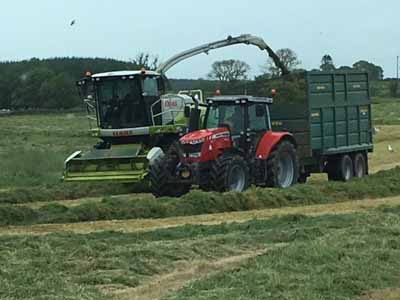At the start of Farm Safety Week, figures from the Health and Safety Executive show that agriculture continues to have the highest number of workplace fatalities in Great Britain. Provisional figures, from 1 April 2020 until 31 March 2021, show 41 people were killed in agriculture related activities, compared to 23 deaths in the previous year. The report, Fatal injuries in agriculture, forestry and fishing in Great Britain 2020/21, has been published to coincide with the start of Farm Safety Week (19 – 23 July) led by the Farm Safety Foundation charity.
While the number of people killed fluctuates each year, the five most common causes of fatal injuries over the last five years remain – being struck by moving vehicles, killed by an animal, struck by an object, falling from height and contact with moving machinery.
NFU Scotland Vice President Robin Traquair is urging all farmers and crofters to constantly think about the risk that any agricultural activity may have for themselves, their staff and families.
He said: “Every death and serious injury on farm has lasting and life changing consequences for family, friends and colleagues. It is well recognised and documented that we work in a dangerous environment on a daily basis, but we shouldn’t just accept that. Instead, we must strive to make improvements, change attitudes and behaviours and rethink the risk.
“As Scottish farmers and crofters, we are justifiably proud of our industry and the farming methods we employ to supply top quality food produced to the highest standards and with great attention to the welfare of our livestock and care for the environment. More often than not, we forget to take a closer look at how we look after ourselves and how we operate in that same environment – do we make it a safe place to work? Could we do better for ourselves, our family and our staff?
“The sooner we embrace change around safety the better. We are really fortunate that we have access to machinery, smart technology and innovation to help us on this journey. There are smart apps that will help those working alone, manage machine operating hours, observe boundaries and livestock, or make you easier to locate in an emergency, such as What 3 Words. (https://what3words.com) .
“There is no place for complacency or ignoring the opportunities to improve safety that are available. So please don’t stick with the ‘I’ve always done it like this attitude’ – be open minded!
“It is all too easy to think that you are only responsible to yourself when taking a risk, especially if you’re self-employed, under stress or worried about costs, but if you are injured or killed you would put an enormous and lasting burden on your family and those close to you. We owe it to ourselves and others in our lives to stop, think and keep things in proportion. We must take safety seriously and help others to do the same.”
- Ahead of Farm Safety Week (19 to 23 July), Aberdeen University PhD student Ilinca Tone used NFU Scotland’s blog to outline the clear link between fatigue and our industry’s appalling record on safety. She also provided top tips to tackle fatigue. Extreme tiredness and high workloads are common in farming – lambing, calving, harvest – and that has a direct connection to the risk of accidents, putting farmers, their families and their staff in danger. Read more at: https://www.nfus.org.uk/news/blog/farmers-must-fight-fatigue-to-improve-farm-safety–guest-blog






